- IR TOP
- IR・Sustainability
- (E) Environmental Initiatives
- Preservation of Resources and Biodiversity
(E) Environmental Initiatives
PRINTBasic Approach
PILOT and the PILOT Group recognize the importance of working to help resolve environmental issues from a global perspective through our business activities.
We will help to bring about a sustainable society while reducing the environmental impact of all aspects of our business operations.
Preservation of Resources and Biodiversity
Given the impact of our corporate operations on the global environment, PILOT and the PILOT Group are deeply involved in environmental conservation.
- Waste reduction and the effective use of resources
- Water resource management
- Pollution prevention
- Conservation of biodiversity
Waste reduction and the effective use of resources
As the global population increases and economies grow, concerns have arisen over environmental pollution and resource depletion due to the increased amount of waste. Therefore, we recognize the importance of waste reduction and are working to use resources more efficiently through reuse and recycling programs.
The PILOT Group has identified “reduction and management of waste” and “efficient use of resources” as crucial sustainability issues. We are working to reduce the environmental impact of all aspects of our corporate operations as much as possible in production processes and other areas.
In our Japan domestic business operations, we have set targets for waste reduction and the effective use of resources, and we have set up initiatives to achieve these targets. We also plan to roll out these initiatives throughout the entire Group.
For one major initiative to reduce and manage waste, we are reviewing production processes at our plants so that the amount of raw materials used can be reduced, which in turn reduces waste output. At our offices and plants, we not only collect and separate out waste, but we review daily operations and manufacturing processes with an eye on reducing the amount of paper and raw materials that we use.
One way we promote the more efficient use of resources is to disassemble and separate materials from products that are returned in the course of doing business, and then using, as effectively as possible, those materials that have value. In the European market, we switched to paper packaging for eco-friendly products, and in the Japanese market, we are starting to use paper packaging and FSC-certified paper for new products.
Goals for waste reduction and effective resource use
We have set a target of reducing the amount of industrial waste generated per unit of PILOT Corporation’s Japan domestic sales (“nonconsolidated sales”) by 10% from 2021 to 2030.
Waste reduction targets
| Target indicators | Target values (target year, reduction level, etc.) | Base year | |
|---|---|---|---|
| Short-term targets (2023, 2024) |
Medium- to long-term targets (2030) |
||
| Industrial waste discharged per unit of nonconsolidated sales | 2% YoY reduction | 10% reduction from base year (1% YoY reduction from 2025) |
2021 |
In addition, to use resource more efficiently, we have set a target of 50% or more for our recycling rate (amount recycled vs. amount generated) of writing instruments that have been returned and discarded.
Targets for effective resource use
| Target indicators | Target values (2023, 2024) |
|---|---|
| Recycle rate of returned and discarded writing instruments | 50% or more |
- * Coverage: Hiratsuka Plant
Waste reduction initiatives
Each business site within the Group is working to cut the amount of waste generated through business operations. Of course, we sort out and collect waste from offices and plants, but we also review daily operations and manufacturing processes with an eye to reducing the amount of paper and raw materials that we consume.
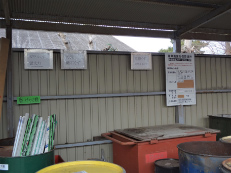
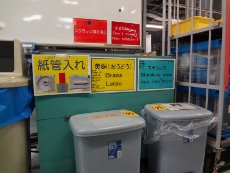
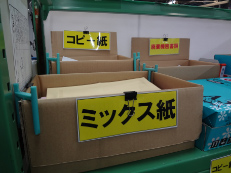
Recycling within plants
At our main production plants, we recycle materials such as plastics and metals that were unused during production and then use them as raw materials. In 2020, the Hiratsuka Plant introduced recycling equipment that turns resin for pen leads into pellet material and reduces waste of this material by 98% from the pre-introduction level. We will continue to promote recycling within this plant.
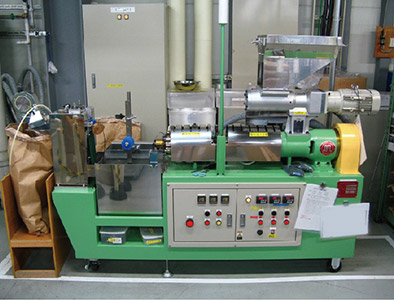
BEGREEN, a global brand for a series of eco-friendly products
BEGREEN is PILOT’s global unified brand for eco-friendly products. This series of environmentally friendly ecological products use recycled materials. In addition to using recycled materials in our products, we are promoting product development that adopts a refillable and replenishing system to cut waste and reduce the amount of single-use products.
We have a wide product lineup from ballpoint pens to markers; some of the main ones are B2P (bottle to pen) ballpoint pens made from recycled plastic bottles, Super Grip G Ocean Plastic ballpoint pens made from recycled marine plastic waste, and Board Master whiteboard markers with replaceable ink and nibs.
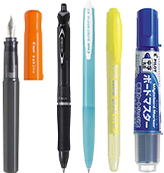
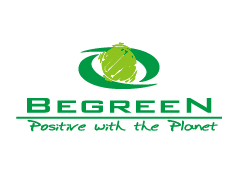
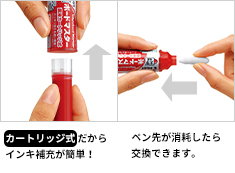
Reception for writing instrument repairs
At PILOT, we extensively employ refillable and replenishing system in products to reduce waste and avoid making single-use products. We believe that the best way to protect the environment is to replace leads or cartridges so that a single writing instrument can be used for a long time. For this reason, we also do repairs.*
- * This service is for Japan domestic customers.
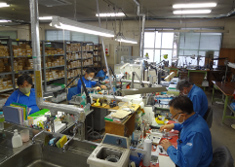
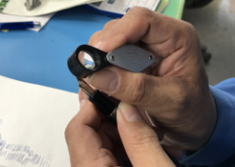
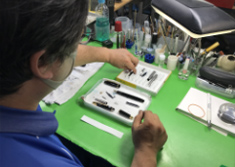
Promotion of plastic-free packaging
Corporate initiatives to address environmental issues are attracting more and more attention, so we are promoting the use of recycled materials in our products and switching to paper-based packaging that does not use plastics.
In the European market, where people are highly conscious of environmental issues, we began switching a few years ago from conventional plastic packaging to eco-friendly recycled paper packaging. More recently, we switched to paper packaging in Japan.
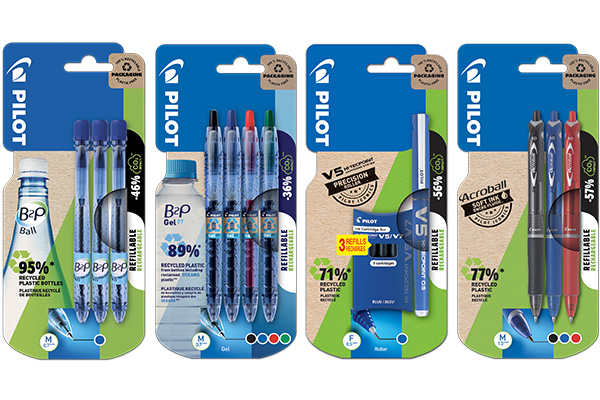
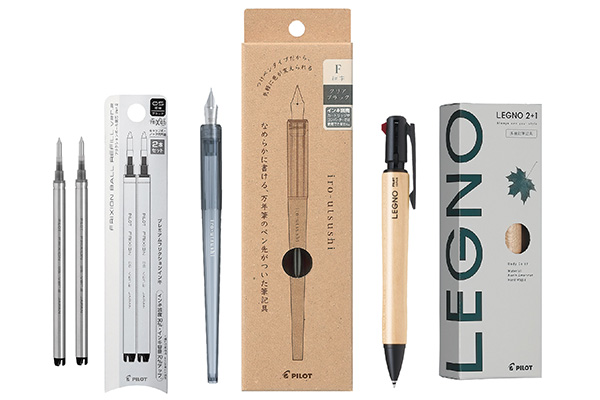
B2P (bottle to pen) writing instruments made from recycled plastic bottles
Since 2009, we have been using plastic bottles and water cooler bottles collected from homes, vending machines, and offices as raw materials for making writing materials at our plants in Japan, France, and the United States and we are selling these in overseas markets. These are replacement core products made for repeated use.
We hope that recycling plastic bottles, a part of our daily lives, into familiar writing instruments will be an environmental initiative that anyone can take part in.
- * B2P are sold only in overseas markets.
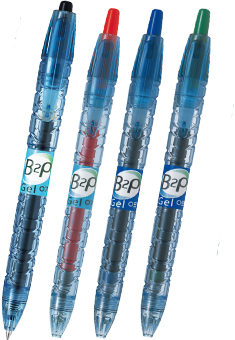
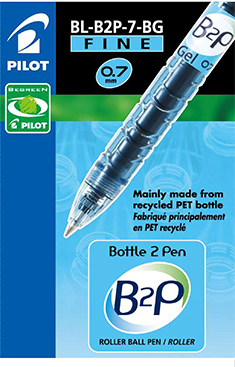
Used pen recycling program
We noticed that many used writing instruments are discarded. In April 2020, we started collaborating with an external partner company to collect and recycle used writing instruments with the goal of reducing our environmental burden and helping to bring about a recycling-oriented society in Japan.
Collected writing instruments are disassembled at a subcontractor’s plant and all materials are recycled. In 2023, we successfully commercialized a pen that uses collected recycled materials for a portion of its parts. We are also engaged in activities such as upcycling leftover collected materials into items other than writing instruments.
When this program began, all PILOT employees and their families in Japan were asked to participate in collecting and recycling, but now the scope has expanded to more than 500 collection locations nationwide at retail stores, local governments, and schools. For collecting and recycling at schools, we hold presentations to give students experience in disassembling and sorting items, as well as environmental studies and research.
We will consider more programs that a wide range of people can participate in, and we will continue to work on the waste plastic problem by reducing the amount of waste from writing instruments.
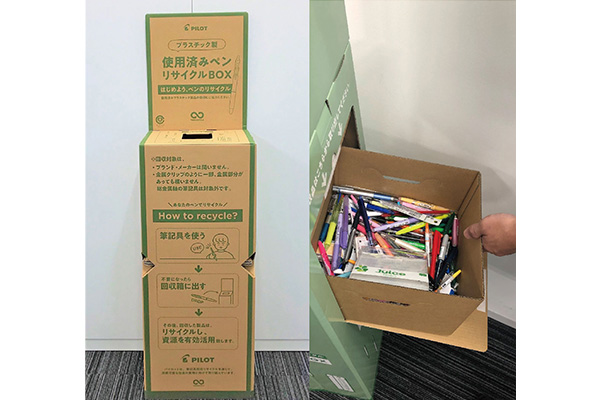
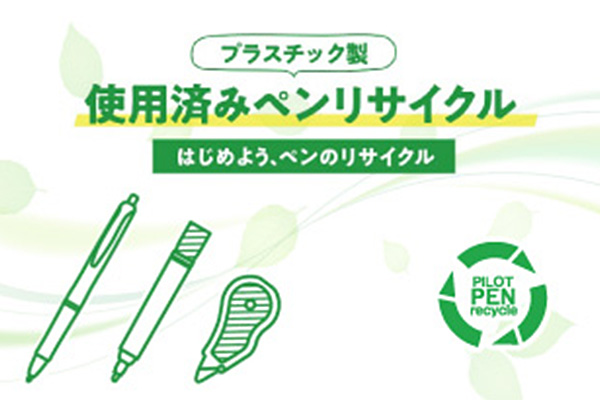
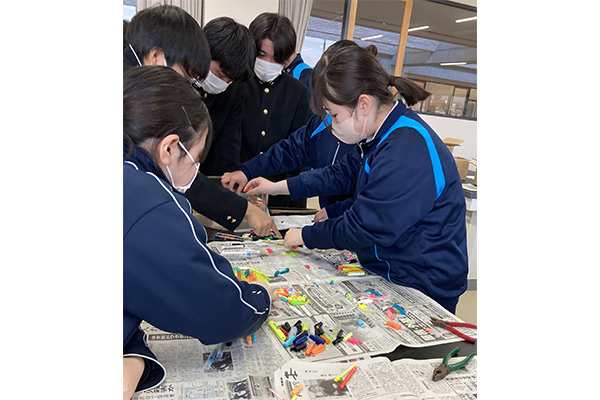
Students at Kurume High School
Toner cartridge recycling
Since 1995, we have been collecting used toner cartridges, replacing drums, and refilling toner through our recycling service in Japan.
By having more people use toner cartridges that have been recycled to strict quality and environmental standards, we promote the reduction of CO2 emissions and plastic waste. Instead of continuing to consume the earth’s limited resources, we intend to circulate them in a sustainable way.
Although more than half of the European and US toner markets are using recycled products, the diffusion rate of recycled toner in Japan is still around 25%. We will continue to promote recycled toner use as part of our initiatives to reduce the burden on the environment.
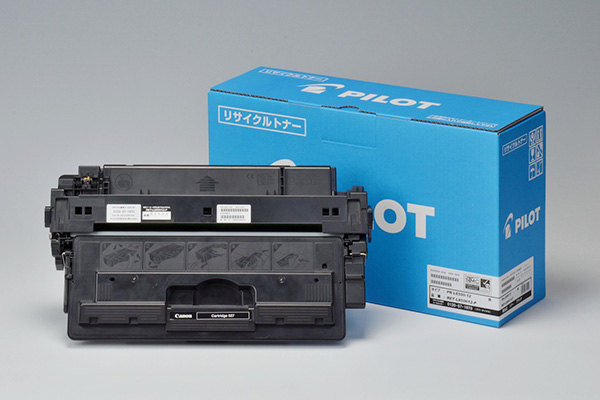
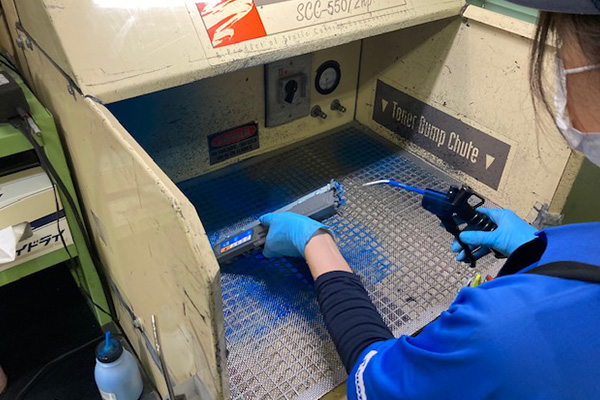
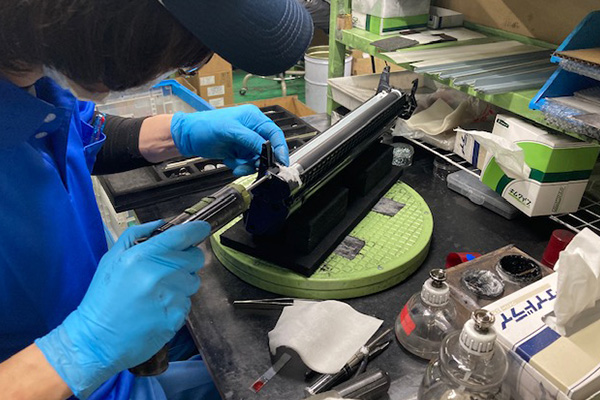
Data on waste and valuable resources
In fiscal 2023, we set out to collect data on the Company’s waste and valuable resources. So, we organized and aggregated data from PILOT Japan domestic operations, such as the amount of waste generated and the amount of valuable resources recovered. We will continue to collect and manage this data while we strengthen ways to reduce waste and use resources more effectively.
Amount of waste generated, recycled, or put in landfill over the past three years (unit: tonnes)
| Main categories | Subcategories | Results | |||
|---|---|---|---|---|---|
| 2020 | 2021 | 2022 | 2023 | ||
| Overall amount | Amount generated | 940 | 1,015 | 1,078 | 998 |
| Amount recycled | 737 | 711 | 753 | 690 | |
| Amount going to landfills | 203 | 304 | 325 | 308 | |
| General waste | Amount generated | 80 | 76 | 93 | 87 |
| Amount recycled | 52 | 46 | 46 | 61 | |
| Amount going to landfills | 29 | 30 | 47 | 26 | |
| Industrial waste | Amount generated | 816 | 913 | 924 | 878 |
| Amount recycled | 651 | 644 | 652 | 609 | |
| Amount going to landfills | 164 | 269 | 272 | 269 | |
| Specially managed industrial waste | Amount generated | 44 | 26 | 61 | 33 |
| Amount recycled | 34 | 21 | 55 | 20 | |
| Amount going to landfills | 10 | 5 | 6 | 13 | |
- * Data coverage: Domestic PILOT Corporation operations
- * Recycled amount includes thermal recycling (energy recovery).
- * Numbers are rounded down, so the totals might not match the sum of the figures.
Valuable resources over the past 4 years (unit: tonnes)
| Main categories | Results | |||
|---|---|---|---|---|
| 2020 | 2021 | 2022 | 2023 | |
| Valuable resources | 956 | 1,212 | 1,126 | 1,544 |
- * Data coverage: Domestic PILOT Corporation operations (Isesaki Plant and Hiratsuka Plant)
Water resource management
Currently, water-related problems have appeared around the world, such as localized downpours and floods due to climate change, as well as chronic droughts and water shortages due to rapid population growth. Amid projections that the demand for water will increase around the world, heavy rains, the depletion of water resources, and the deterioration of water quality are expected to affect the PILOT Group’s production and procurement of raw materials.
We had identified “water resource management” as a crucial sustainability issue. In addition to promoting the efficient use of a limited water supply by making this issue known to employees and working to reduce the amount of water used in business activities, we intend to improve the efficiency of water use by setting and managing the appropriate amount of water used during production. We contribute to the creation of a society where water can be used sustainably throughout the supply chain.
The PILOT Group’s business activities would be negatively affected by the depletion of water resources and deterioration of water quality, but we also consider water-related natural disasters, such as floods, to be a major risk. Climate change is expected to make typhoons and heavy rains more severe, and if rivers overflow as a result, physical damage is expected. We have formulated a business continuity plan (BCP) and we are working hard to prepare for water-related natural disasters. In addition, we use Aqueduct, a tool provided by the World Resources Institute (WRI), to assess water risks, mainly at our production plants, and strive to understand and develop responses to disasters.
Data on water intake and wastewater
Our Japan domestic production plants (Isesaki Plant, Hiratsuka Plant) use water to clean equipment, for cooling, and to manufacture water-based ink, among other things, and we intend to use water more effectively. In fiscal 2023, we set out to determine our water intake and wastewater amounts at each of PILOT’s plants, with a focus on domestic production. We will continue to promote the efficient use of water resources.
Based on the Pilot Group Environmental Policy, we regularly check on compliance with environmental laws and regulations, including water quality standards, at every plant. In fiscal 2022 and 2023, there were no violations of water quality standards or regulations.
Water intake reduction target
Taking 2019 as our base year, we have set a reduction target for water intake per unit of nonconsolidated sales and are working towards achieving them.
| Target indicators | Target values (target year, reduction level, etc.) | Base year | |
|---|---|---|---|
| Short-term targets (2023, 2024) |
Medium- to long-term targets (2030) |
||
| Water intake per unit of nonconsolidated sales | 1% reduction from base year | 10% reduction from base year | 2019 |
Water intake and wastewater over past 4 years
| Results | |||||
|---|---|---|---|---|---|
| 2020 | 2021 | 2022 | 2023 | ||
| Total water intake (thousands m3) | 81 | 94 | 89 | 82 | |
| Supplied (municipal) | 78 | 92 | 87 | 80 | |
| From wells | 2 | 2 | 2 | 2 | |
| Total wastewater (thousands m3) | 80 | 94 | 88 | 81 | |
| Sewer system | 38 | 42 | 42 | 39 | |
| Rivers | 42 | 52 | 46 | 42 | |
| Total BOD output (ton) | 1 | 1 | 1 | 2 | |
- * Data coverage: PILOT Corporation’s domestic operations
- * Numbers are rounded down, so totals might not match the sum of the figures.
Pollution prevention
We understand that we use chemical substances and discharge waste and wastewater, and we are aware that our businesses place a burden on the global environment. Therefore, to grow our business over the medium to long term we believe it is important to keep in mind the sustainability of the global environment and to reduce our impact on the global environment as much as possible.
Based on the PILOT Group Environmental Policy, the Group complies with environmental laws, regulations, ordinances, and other requirements in all aspects of corporate operations, including production, and we strive to prevent pollution of the air, the soil, and water.
At our plants in Japan and overseas, we ensure that air and water pollutants, including volatile organic compounds (VOCs) that cause photochemical smog, are within the standards set by laws, ordinances, and pollution prevention agreements with local governments. We intend to reduce the environmental burden associated with our operations by thoroughly managing emissions. For example, every year at every plant we measure emissions and transfers of substances such as dichloromethane, which is subject to the Pollutant Release and Transfer Register (PRTR) and VOC emission regulations. In the washing process at the Isesaki Plant and in processing at the Hiratsuka Plant, we have switched to alternative solvents, reducing the amount of dichloromethane used by about 40 tonnes compared with fiscal 2016. In addition, we are testing water quality to get a clearer understanding of BOD (biochemical oxygen demand).
In fiscal 2022 and 2023, we kept pollutants below the standards set by laws and ordinances at our domestic production plants (Isesaki Plant, Hiratsuka Plant).
Conservation of biodiversity
In recent years, environmental diversity and the diversity of all living things have degenerated as ecosystems have been lost, so their conservation has become a global issue.
The PILOT Group has identified “conservation of biodiversity” as a crucial sustainability issue. We are reducing the impact on biodiversity and the environment from all parts of our business operations, including product planning, design, production, and sales. While collaborating with stakeholders, we will go all-out to conserve biodiversity and ecosystems, the foundation of all of our activities, and contribute to the achievement of a sustainable society.
Our take on the conservation of biodiversity is that reducing our impact on the global environment will also lower the risk of biodiversity loss. We are promoting initiatives such as climate change countermeasures, waste reduction, effective use of resources, and pollutant management. In particular, at production plants that emit large amounts of environmentally harmful substances, we have recognized the need to reduce those risks to the global environment and biodiversity and we are intensively promoting environmental initiatives in response.
Plastic resource recycling is an environmental issue close the PILOT Group, and we recognize that urgent work is necessary given the impact of plastic on marine biodiversity and ecosystems. The Group is working to reduce plastic use as much as possible, to reuse and recycle used plastic, and to reduce the amount of plastic waste. Specifically, we are promoting the manufacture and sale of ballpoint pens using oil-based ink that are made from resin from recycled marine plastic waste. We switched the packaging for these pens from conventional plastic to paper. In Japan, we are also developing a program to collect and recycle used writing instruments. We will continue to provide products and services that help to reduce the Group’s environmental impact.
Super Grip G Ocean Plastic
In 2020, we launched an initiative to reduce marine plastic waste and microplastics by manufacturing and selling ballpoint pens with oil-based ink that are made of resin recycled from marine plastic waste collected by external partner company in Japan. Recycled plastic from the ocean is used for part of the main body and recycled materials are also used for other parts, achieving a recycled material rate of 70% or more, excluding replaceable parts. We will increase the use of recycled materials derived from marine plastic waste, promote their distribution and collection, and cooperate in reducing marine plastic waste.
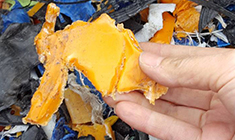
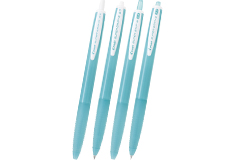
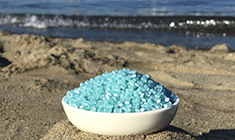
Ballpoint pens made from plant-derived biomass plastic
Since 2022, we have been manufacturing and selling writing instruments that incorporate biomass plastic, which is made from plant-derived organic resources, excluding fossil resources such as petroleum.
Carbon dioxide (CO2) is emitted when plastics are incinerated, but unlike petroleum-derived plastics, the corn and wheat used in biomass plastic absorb CO2 during their growth. Since CO2 has already been absorbed, the use of biomass plastic slows the increase of CO2 in the atmosphere (carbon neutral). Therefore, we expect biomass plastic to contribute to the prevention of global warming and to reduce dependence on fossil-based resources.
To curb global warming, we will promote initiatives starting with what we can do through our business operations.
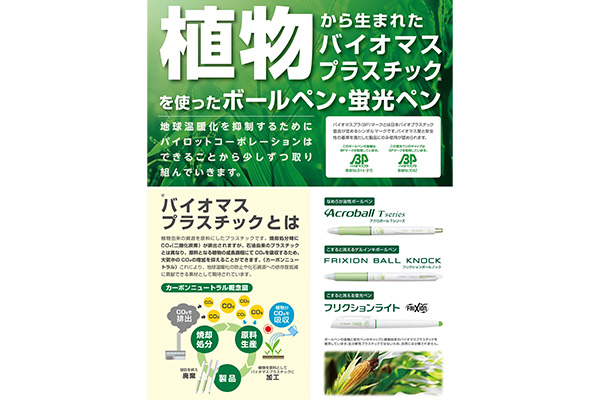
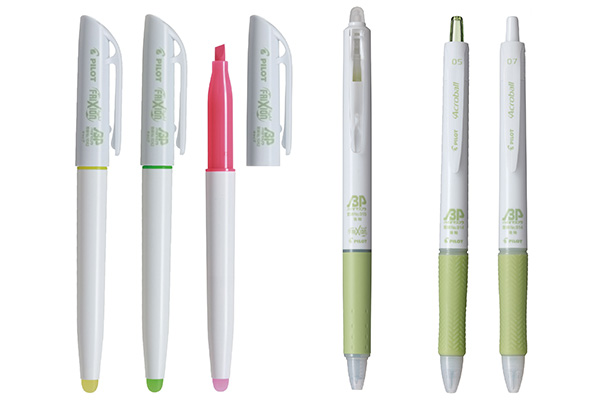
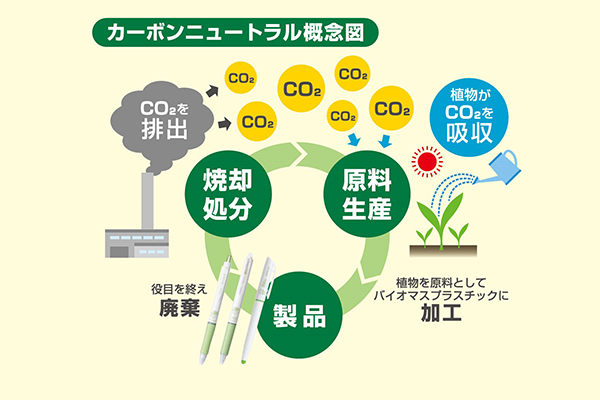
In 2022, the PILOT Group formulated the Pilot Group Sustainable Procurement Policy and Pilot Group Sustainable Procurement Guidelines to promote initiatives that take into consideration the environment and society, including biodiversity, throughout the supply chain. The guidelines call for “consideration for biodiversity” and ask our suppliers to also take measures that respect the global environment and biodiversity. We will contribute to the conservation of biodiversity throughout the supply chain by implementing initiatives based on these policies and guidelines.
- PILOT Group Sustainable Procurement Policy(185KB)
- PILOT Group Sustainable Procurement Guidelines(214KB)
PILOT Pen France has signed a partnership agreement with the French NGO The SeaCleaners in support of tackling the marine plastic problem and protecting the world’s oceans. In the future, The SeaCleaners plan to launch a plastic recovery ship that is powered by sunlight and wind. While collecting and disposing of microplastics floating on the ocean’s surface, the goal of this initiative is to study marine plastic pollution and eliminate it at the same time. Through our support for The SeaCleaners, we will conduct educational programs on biodiversity as well as promote recycling and reuse for the conservation of marine ecosystems.
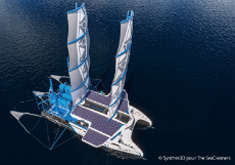
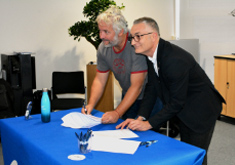
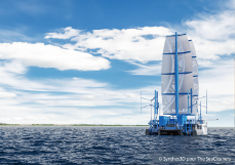
Related webpages
- (E) Environmental Initiatives
- (S) Social Initiatives
- (G) Corporate Governance
